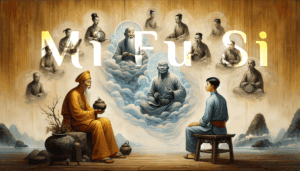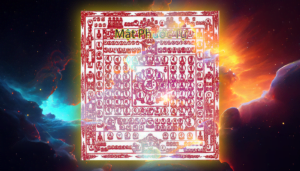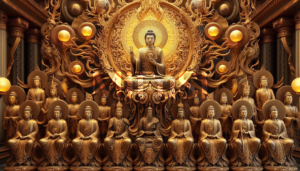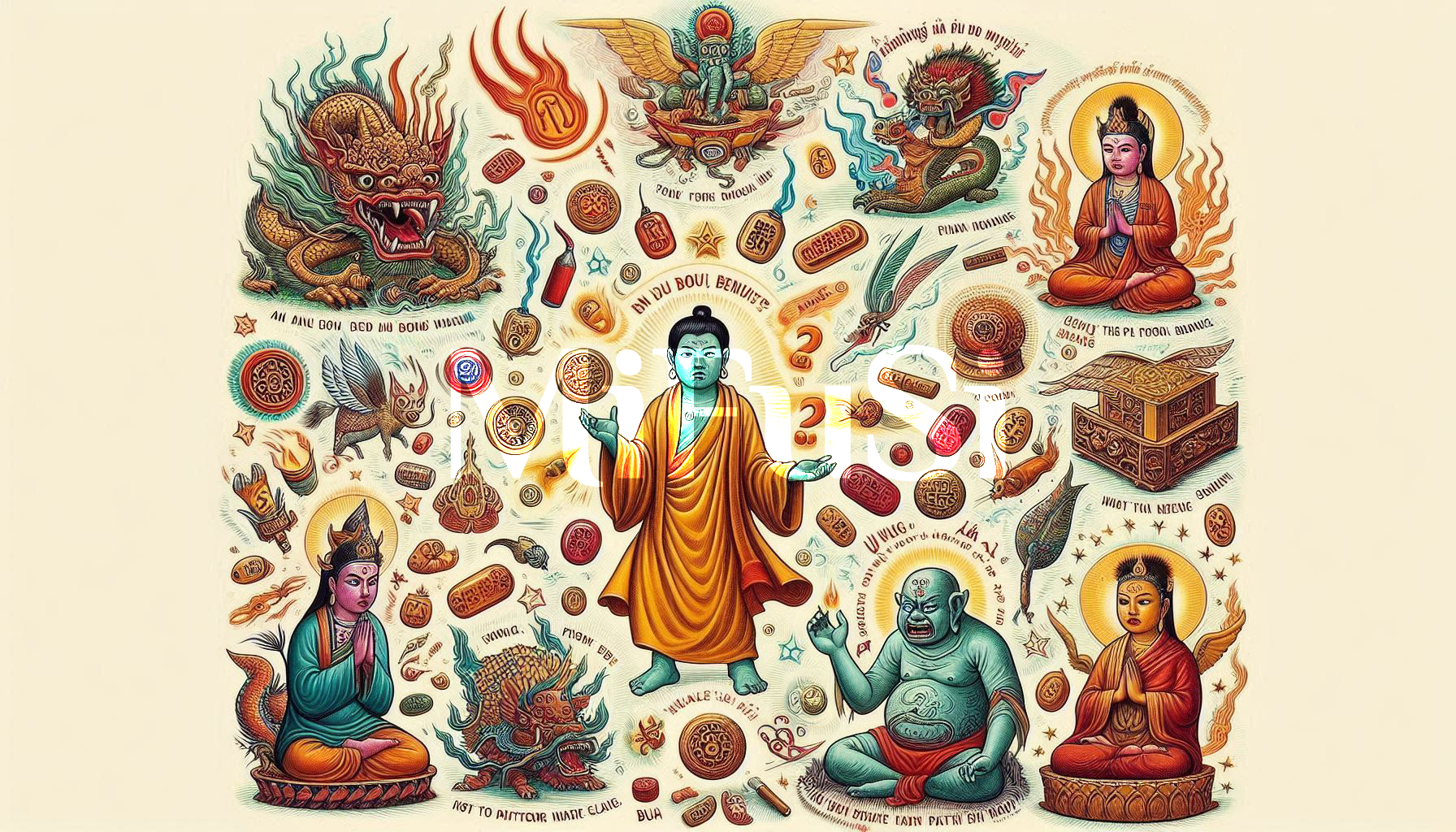Interpreting “Bùa” and “Chú” in Mystical Practices
Translation from: Bùa, chú Mật tông by Akira
When encountering spells, amulets, and incantations, some people react with dismissal, fear, or denial, while others hope to gain some sort of benefit, often driven by superstition.
In Master Trieu Phuoc’s book “Essence of Esoteric Buddhism,” there are various types of amulets, seals, and magical practices mentioned, but there’s no explanation given for them. They’re considered not to offer any clear benefit.
But what exactly are “bùa” and “chú”?
“Bùa” refers to a piece of paper with images of gods and spirits or written commands addressed to underworld spirits, often accompanied by an incantation called “chú.” Using a “bùa” always involves reciting the corresponding “chú.” People have come up with different explanations based on their understanding, but these explanations usually just scratch the surface of their meaning.
In everyday language, “bùa” is used to describe simple charms used in daily life. In religious contexts, they’re called “Linh phù” (sacred images) and “thần chú” (god’s formula). “Linh phù” helps distinguish them from folk charms like love spells and voodoo. Basically, charms used for personal desires are often linked to black magic, while sacred images in religion are seen as white charms used to perform miracles.
The Celestial Scroll in the “Essence of Esoteric Buddhism” is a big sacred symbol, symbolizing the cosmic government, which includes the Supreme Being and the Holy Spirits (or the Great Sun Buddha and the ten directions Buddhas). It’s similar to how the American flag represents the United States. Each state and military branch has its own flag, and similarly, different sacred images represent different levels of celestial authorities within the Celestial Government.
A flag represents a group, not an individual. Though it might seem like just a piece of cloth, it’s hugely important for a group or organization, showing its authority and power. That’s why it should never be underestimated or treated casually. In the military, soldiers stand at attention and salute the flag every morning. Even presidents and officials pay their respects to the flag during important ceremonies. Behind its physical appearance lies the strength of the group; having a flag means having troops and authority.
Mystical practitioners have various linh phù associated with their organization and their position within the celestial hierarchy, which they use to serve the Celestial Government. These linh phù are strictly reserved for official religious purposes and shouldn’t be used for personal matters.
In addition to the linh phù representing the authority of the celestial government, there are other linh phù used as petitions or requests directed towards higher divine authorities.
Mudra or Seal: It is a stamp used to affix on official documents, with each government agency having its own unique seal. Mystical practitioners use the seal by forming a mudra sign when petitioning the celestial government for various purposes. Additionally, the seal serves as an identification code for divine beings when communicating with practitioners.
Incantation (chú): The incantation, akin to a magic formula, functions like a phone number for contacting a government agency. Every government entity, ranging from executive to advisory levels, possesses its own distinct phone line.Ordinary folks don’t have direct access to government hotlines. They typically rely on numbers for basic services like electricity or social aid, and in the US, the emergency line 911. Similarly, in religious traditions, there’s a spiritual equivalent to “911” called “Nam mô cứu khổ cứu nạn Quan Thế Âm Bồ Tát,” which translates to “Homage to Bodhisattva Avalokiteshvara, rescuer from suffering and calamity.”
While anyone can chant this incantation for aid, whether they receive help and if it arrives in time remains uncertain. Much like dialing 911 doesn’t ensure immediate assistance; it’s a roll of the dice.
Exclusive to government officials, they use official lines for intercommunication, reporting, seeking directives, or soliciting assistance. In a similar vein, celestial officials, represented by religious practitioners, employ incantations to converse with divine spirits, seeking guidance and support from the Celestial Government during their spiritual endeavors.
Amulets, incantations, and seals serve as tools for practitioners to fulfill their roles within the Celestial Government, guided by divine will. These tools aren’t inherently sinister; rather, they signify the tangible presence of celestial authorities. Understanding their importance is vital for both novice mystical practitioners and seasoned officials. Mastery in spiritual practice may render these tools unnecessary, as individuals can directly communicate through intention, akin to a minister who issues orders without lengthy paperwork.
However, these mystical practices have sometimes been misunderstood or exploited. Vague explanations and opportunistic individuals have led to confusion and misuse. Fraudsters may copy spells from books or create their own to manipulate or intimidate others. Similarly, misappropriating symbols of authority, such as forging official documents or seals, inevitably leads to exposure and punishment.
In the celestial realm, seals, incantations, and amulets carry significant weight and should not be counterfeited or misused. They are not mere symbols but conduits for celestial protection. When used appropriately and in alignment with divine will, practitioners can employ them to protect or even influence a nation’s destiny based on its karma. However, without legitimate purpose, these tools lose their potency and become empty gestures lacking divine approval.
Individuals who study magic do so in service to the celestial realm. However, if they misuse their abilities, employing spells against divine will, they are held accountable. Nevertheless, certain actions, though they may seem malevolent, might be justified if they align with the broader divine plan. For instance, if a judge like Bao Zheng administers justice impartially, or an executioner carries out their duty without malice, even the act of taking a life may not be deemed sinful.
Practical Use of Protective Amulets:
Once, a young man, fleeing the communist regime in Vietnam by sea, found himself among fellow escapees when they encountered pirates. Contrary to the usual threats of violence and theft faced by the boat people, the pirates surprisingly treated them with hospitality. In an unexpected turn, they even offered the young man cigarettes before escorting him onto another boat, along with a letter of recommendation to ensure safe passage if he encountered other pirate groups. This incident sheds light on the possibility that even pirates may possess magical talismans and supernatural connections, deterring them from harming individuals under divine protection. It serves as a powerful reminder of the vulnerability of those lacking moral fortitude or spiritual resilience.
Related Post

REVELATIONS FROM OTHER MYSTICAL SECTS
REVELATIONS FROM OTHER MYSTICAL SECTS Revelations from more than 11 mystical sects (Thần khải từ hơn 11 tông phái huyền...

Chapter III: II – Lecture on Dharanis from various Sutras in Secret Buddhism
Apart from the fundamental Mahavairocana and Vajrasekhara Sutras, Buddhist masters who compiled the Tripitaka (three 'baskets' of Sutras on: Doctrine,...

GLOBAL PERIL
GLOBAL PERIL (Thế giới trên bờ vực thảm họa - by Rainbow on Thu Aug 16, 2012 - translated by...

Chapter I: VI – HOMA (Part 6/6)
VI. HOMA (Goma, jap): Homa is the "Fire" ritual meditation. Originating in ancient India, it was later appropriated to Buddhist...

Old-Guru Self Introduction
Old-Guru Self Introduction All stories from Old Guru #1 through #15 were posted on the thegioivohinh forum while vutruhuyenbi is...

Atheism vs Blind Believer
Atheism vs Blind Believer The issue of Faith in major religions The concept of faith varies significantly across major religions....

Old-Guru Self Introduction
All of the stories from Old Guru #1 thru 15 were posted at Forum: thegioivohinh Foreword: I would like to use...

Nechung Oracle – Freedom in Exile
Dear Mystics Members, Explore an excerpt from the Dalai Lama's "Freedom in Exile." Delve into Chapter 12, "Of Magic and...
